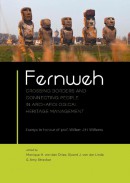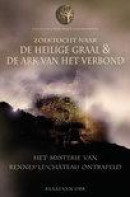Product informatie
- ISBN 9789081810913
- ISBN 10 908181091X
- Druk 1
- Bindwijze Paperback
- Taal Engels
- Uitgever Sidestone Press
- Onderwerp Archeologie
- Beschikbaar sinds 5 Juni 2013
Samenvatting
In 2012 it was 50 years ago that the initial independent core of the Faculty of Archaeology was founded. On the occasion of this 50th anniversary the Board of the Faculty of Archaeology has asked the editors of the Analecta Praehistorica Leidensia to produce a special volume of Analecta and open its pages not only for Prehistoric research but to all Archaeological disciplines. The editors invited the permanent staff of the Faculty to provide a contribution. The End Of Our Fifth Decade is the result. The subjects offered are very diverse and provide the reader with a written 'Tableau de la troupe', as it was intended to be. The first contributions are about the present. They deal with the problem of preserving archaeology in situ, the evaluation of twenty years of the Malta convention ... and the current variety of approaches in archaeology. However the rest of the book is about the past. This volume is organised in such a way that you go back in time and as good archaeologists we start from the top and dig our way into the past. The part about the past starts in the 17th century AD in the Caribbean and end with research on a 300 000 years old site from Germany. Table of contents: Problems with preservation in situ Willem J.H. Willems Twenty years after Malta: archaeological heritage as a source of collective memory and scientifi c study anno 2012 Monique van den DriesSjoerd van der Linde The internationalization of archaeological discourse?John Bintliff A short history of archaeological research in the Lesser Antillean archipelagoArie Boomert Indigenous religious traditions in Central Nicaragua: ethnohistorical documentation for an unknown archaeological recordLaura N.K. Van BroekhovenAlexander Geurds Caribbean encounters: rescue excavations at the early colonial Island Carib site of Argyle, St. VincentCorinne L. HofmanMenno L.P. Hoogland The ancient Mexican Books of Time: interpretative developments and prospectsMaarten E.R.G.N. Jansen Structuring the landscape in Iron Age and Roman period (500 BC - AD 250): the Multi-period site Oss-HorzakRichard JansenStijn van As Investigating imperial space on the Palatine Hill in Rome: preliminary results of the Domus Flavia 2012 research campaignNatascha SojcLéon J. CoretLisa C. Götz Decoration and ideology in Nero's Domus Aurea in Rome Paul G.P. MeyboomEric M. Moormann Connectivity in the south-western part of the Netherlands during the Roman period (AD 0-350)Jasper de Bruin Archaeobotanical evidence of the fungus Covered smut (Ustilago hordei) in Jordan and Egypt 159René T.J. CappersFederica FantoneReinder NeefClasina J.G. van Doorn Adonis: a Greek ritual and myth in the Etruscan worldL. Bouke van der Meer Avoiding crop failure in the Iron Age: maslins and emergency crops on the loess soils of western continental Europe, with a special note on oat (Avena sativa) and foxtail millet (Setaria italica) Corrie Bakels Hallstatt burials of Oss in context Harry FokkensSasja A. van der VaartDavid R. FontijnSimone A.M. LemmersRichard JansenIvo M. van WijkPatrick J.C. Valentijn Decorated and 'killed'? The bronze sword of WerkhovenDavid FontijnLiesbeth TheunissenBertil van OsLuc Amkreutz Master and apprentice? A short note on wall construction in Ancient SyriaDiederik J.W. Meijer The materiality and social value of amber objects during the Middle Jomon in JapanIlona R. Bausch Workshop sites in a Neolithic quarry landscape (Geul valley, southern Limburg, the Netherlands)Alexander Verpoorte The archaeological practice of discovering Stone Age sitesMilco WansleebenWalter Laan A causewayed enclosure near Ermelo?Hans KamermansJoanne MolEric DullaartMiranda de Kreek New perspectives for microwear analysisAnnelou van Gijn Radiocarbon and fossil bones: what's in a dateHans van der Plicht Chronology of the Dutch Neolithic Bandkeramik Culture: a new attemptPieter van de Velde Burning down the house: the burnt building V6 at Late Neolithic Tell Sabi Abyad, SyriaPeter M.M.G. AkkermansMerel BrüningNeeke HammersHarmen HuigensLennart KruijerAnna MeensOlivier NieuwenhuyseAndrea RaatEsther F. RogmansCorijanne SlappendelSofi a TaipaleSophie TewsEva Visser The trouble with stratigraphy: case studies from the Near EastBleda S. Düring Stable isotopes of Upper Weichselian land snails from Lakitelek (Hungary): a contribution to understanding the climatic context of the Upper Palaeolithic of the Hungarian basinAlexander VerpoorteSimon R. TroelstraKay C.J. BeetsPál Sümegi Confi rmation of the presence of Cucubalus baccifer L. (Caryophyllaceae) in the British PleistoceneMichael H. Field Beyond '15 minutes': revisiting the late Middle Pleistocene archaeological record of Maastricht-Belvédère (The Netherlands)Dimitri De LoeckerWil Roebroeks Schöningen: the history and results of 20 years archaeozoological researchThijs van Kolfschoten
Boeken van Joanne Porck & Corrie Bakels & Hans Kamermans
Meer boeken van uitgever Sidestone Press
Meer boeken met de onderwerpen Archeologie
Veel gestelde vragenmeer antwoorden
Hoe werkt Resale.nl?
Je kunt op de website advertentie(s) plaatsen van de boeken die u wilt verkopen. Een potentiële koper neemt dan contact met je op om samen een prijs af te spreken en de transactie verder af te handelen. Houdt hierbij onze aanbevelingen voor een veilige transactie in gedachten en voorkomt dat je slachtoffer wordt van oplichting.
Hoe kom ik in contact met de verkoper?
Je kunt een reactie versturen door bij de betreffende advertentie van de verkoper op de knop ‘doe een bod’ te drukken. Je kunt nu een bod doen op de advertentie en een persoonlijk bericht toevoegen. Het verstuurde bod brengt je in contact met de verkoper via e-mail.
Wat zijn de kosten voor het verkopen van mijn studieboeken?
Je kunt geheel gratis gebruik maken van de diensten van Resale.nl. Resale.nl haalt zijn inkomsten uit advertenties.
Hoe kan ik een boek kopen?
Resale.nl werkt globaal op de volgende manier:
- Zoek via het zoekveld het studieboek dat je wilt kopen.
- Uit de zoekresultaten kies je het studieboek waar je geïnteresseerd in bent.
- Op de detailpagina van het studieboek kun je een overzicht vinden van de personen die het studieboek verkopen.
- Je kunt nu een bod plaatsen door op de button te klikken. Het bod wordt via e-mail aan de verkoper verzonden.
- De verkoper van het studieboek neemt contact met je op door een reactie te geven op het bod dat je hebt verzonden. Met de verkoper kun je gezamenlijk een prijs afspreken. Houdt hierbij onze aanbevelingen voor een veilige overdracht in gedachten en voorkom dat u slachtoffer wordt van oplichting.
Hoe weet ik wat ik koop?
Om te achterhalen of wat je koopt ook daadwerkelijk is wat er wordt geadverteerd is het verstandig om bij de verkoper langs te gaan en het aangebodene te bezichtigen. Doe je dit niet, dan loopt je een zeker risico. Onder het kopje ‘Hoe kan ik de kans op misbruik verkleinen’ kun je meer over dit onderwerp vinden.
Kopers over Resale.nl
bart van gijsel
"Ik ben erg tevreden over deze verkoper de familie thus. Goede snelle levering."
Patrice Michel
"De verkoper heeft er alles aan gedaan om het door mij bestelde product zo snel mogelijk naar mij toe te krijgen. Heeft me van iedere stap op de hoogte ..."
marjolein
"Besteeling snel bezorg, in goede staat net zoals beschrijving en goede communicatie met verkoper!"
marjolein
"Goed contact, snel en in goede orde ontvangen. Staat van het boek was zo goed als nieuw!"
hilda1
"goede medewerking en hulp dank u wel"
Tineke
"Het bestelde werd netjes en snel afgeleverd. De prijs was goed."
stacy
"Goed verpaktBoek ziet er mooi uit"
elisa
"Goede levering alleen jammer dat er niet bij was gezet dat er al in geschreven was"
Elly
"Verkoper reageerde snel op mijn emails en heeft ook het boek snel opgestuurd.Het boek was niet van nieuw te onderscheiden. Was waarschijnlijk niet gebruikt. ..."
Gerard+[2]
"Prettig contact gehad en goed zaken kunnen doen."
























